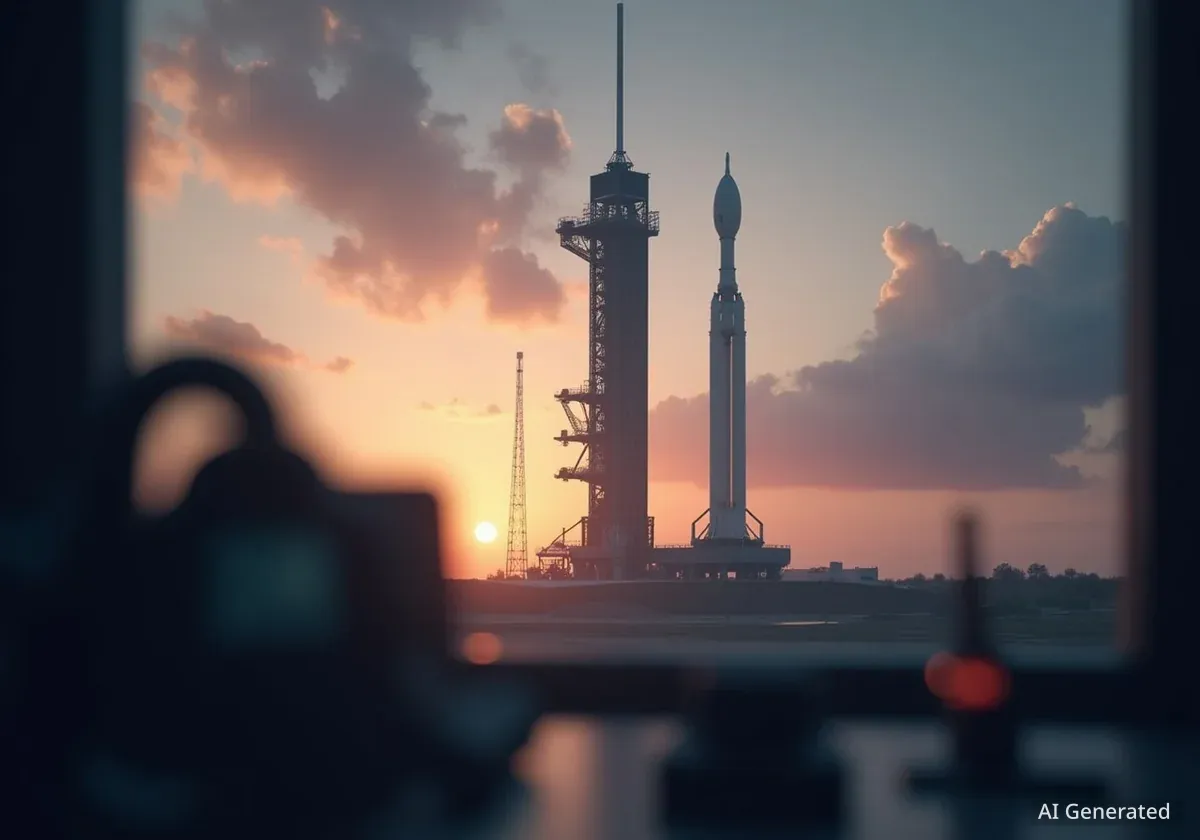A new bipartisan bill has been introduced in the U.S. Congress aimed at simplifying regulations for the commercial space industry. Known as the LAUNCH Act, the legislation seeks to streamline licensing for private space companies, a move lawmakers say is critical for the United States to maintain its competitive edge against China's rapidly advancing space program.
Key Takeaways
- The LAUNCH Act aims to cut regulatory red tape for commercial space launches and satellite systems in the U.S.
- The bill has strong bipartisan support in both the House of Representatives and the Senate.
- Lawmakers cite the need to stay ahead of China's accelerated space activities as a primary motivation for the legislation.
- The proposal focuses on fostering innovation within the U.S. private space sector to ensure national security and economic strength.
New Legislation Aims to Boost US Space Industry
A legislative proposal titled the Licensing Aerospace Units to New Commercial Heights (LAUNCH) Act was recently introduced in the House of Representatives. The bill’s primary objective is to modernize the regulatory framework governing the private space sector in the United States.
Specifically, the act calls for streamlining the application process for commercial space launch and reentry operations. It also seeks to simplify the licensing of private remote sensing space systems, which are crucial for Earth observation and data collection.
Bipartisan Support for Regulatory Reform
The bill was introduced by Republican Representative August Pfluger of Texas, who emphasized the importance of space for America's future security and economic stability. He framed the legislation as a necessary step to counter strategic competitors.
"As adversaries like China seek to weaponize and exploit the space domain and the emerging technologies that come from it, we must implement long-overdue regulatory reforms that keep the United States at the forefront," Representative Pfluger stated.
The effort is not limited to one party or chamber. An identical bill was introduced in the Senate in June by Republican Senators Rick Scott and John Cornyn, with support from Democratic Senators Ben Ray Lujan and Mark Kelly, a former NASA astronaut. This widespread support signals a shared sense of urgency among lawmakers regarding the nation's position in space.
A History of Bipartisan Action
This is not the first attempt to pass such legislation. A previous version of the bill was introduced last year with backing from a bipartisan group of lawmakers, indicating a sustained effort in Congress to address the challenges facing the U.S. space industry.
The New Space Race with China
For decades, the United States has been the undisputed leader in space exploration, a status cemented when Neil Armstrong walked on the moon. The U.S. currently operates the largest number of satellites and led the world in orbital launches last year, with private companies like SpaceX accounting for more than half of those launches.
However, China's space program has made significant strides in recent years, creating a new competitive dynamic. Many experts now view the current landscape as a 21st-century space race, echoing the Cold War rivalry with the Soviet Union.
China's Major Space Achievements
- Lunar Exploration: Successfully landed robotic rovers on both the near and far sides of the moon, a historic first achieved in 2019.
- Mars Mission: Deployed a rover on Mars, joining the U.S. as one of only two nations to operate a rover on the Red Planet.
- Space Station: Independently constructed and operates the Tiangong space station, which became operational in 2021.
Concerns Over America's Pace
A recent report from the Commercial Space Federation, a key industry group supporting the LAUNCH Act, warned that China's program is "accelerating beyond America’s pace in many areas." The report highlighted China's strategic investment and consistent progress in meeting its ambitious space milestones.
With the International Space Station (ISS) scheduled for retirement in the early 2030s, China's Tiangong could soon become the only state-operated space station in orbit. Furthermore, Beijing and Moscow are discussing plans for a joint permanent base on the moon, an objective the U.S. is also pursuing through its Artemis program.
Differing Perspectives on Space Exploration
While U.S. lawmakers increasingly frame the space domain in competitive terms, China officially maintains that its goals are peaceful. A spokesperson for the Chinese Embassy in the U.S., Liu Pengyu, stated that his country is committed to the peaceful use of outer space.
"China has no intention to engage in a space race, nor do we seek so-called edge in outer space," Liu said. "We stand ready to deepen international space exchanges and cooperation... on the basis of equality, mutual benefit, peaceful use and inclusive development."
However, this perspective has not gained traction in Washington. U.S. policy has become more restrictive toward collaboration with China in space. The 2011 Wolf Amendment already bars China from participating in the ISS. More recently, reports confirmed that NASA has banned Chinese citizens from participating in its programs.
NASA Administrator Sean Duffy expressed this sentiment clearly on social media, stating, “China is NOT going to the moon with good intentions. America will get there FIRST, preserving peace for both the U.S. and our international partners.”
Streamlining for a Competitive Future
Supporters of the LAUNCH Act argue that simplifying the U.S. regulatory environment is the most effective way to empower the nation's innovative private sector. They believe that reducing bureaucratic delays will allow American companies to develop and deploy new technologies faster.
Democratic Representative George Whitesides of California, a co-lead for the bill and former CEO of Virgin Galactic, shared his experience from both the public and private sectors.
"I’ve seen firsthand how outdated and duplicative regulations can slow down American innovation," Whitesides explained. He added that the LAUNCH Act will "cut red tape, improve coordination across agencies, and make it easier for U.S. companies... to compete and lead in the global space economy."
By modernizing these processes, the bill's proponents believe the U.S. can ensure it remains the global leader in aerospace, securing both its national security and its economic future in the final frontier.





